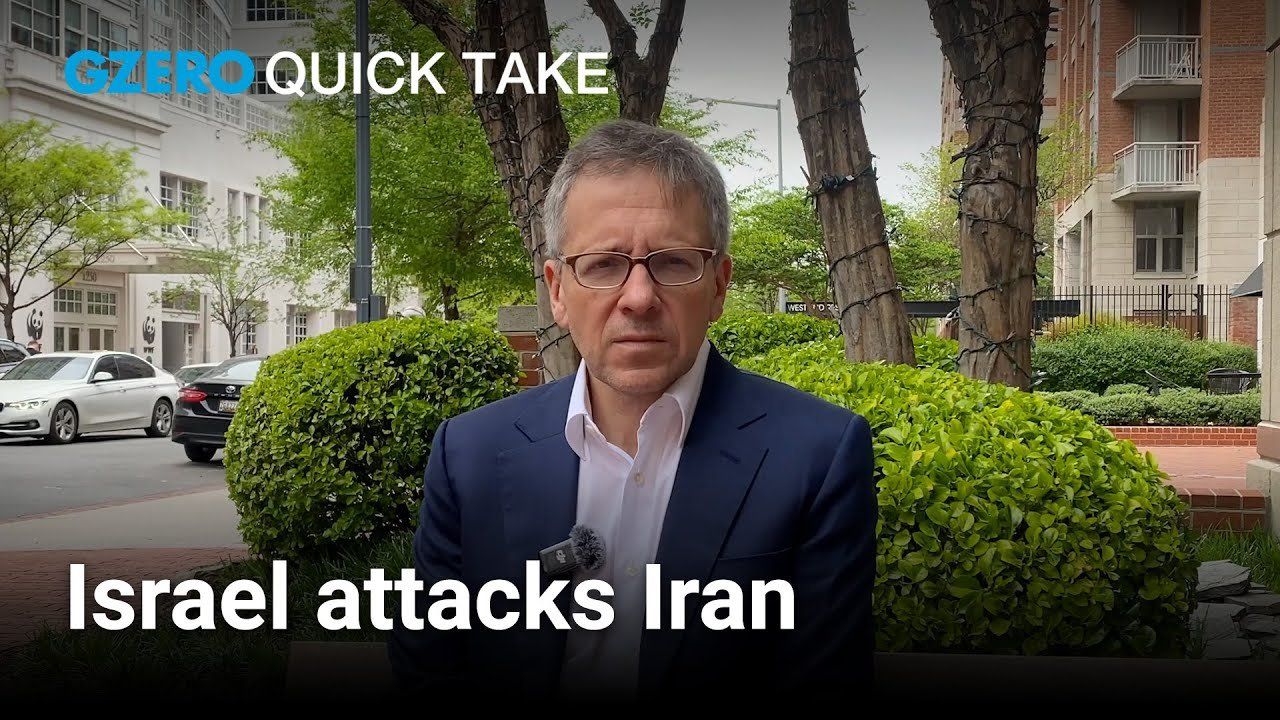
Ian Bremmer's Quick Take: Hi, everybody. Ian Bremmer here and a Quick Take on the latest in the Middle East crisis. And things actually looking a little bit more stable today than they have over the past couple of weeks. And that is some very welcome news.
The headlines, of course, that the Iranians have been hit by Israel, though no one is saying that Israel has admitted to doing it, in the town of Isfahan. Clearly, military targets and the Iranians trying to knock down those missiles coming over. But this was a significantly more restrained attack than what the Israelis did to kick off this crisis, which was attack an Iranian government building in Damascus and target and assassinate a senior Iranian leader. That led to the Iranian response that we saw over the weekend, which was a significant and serious one, with a few hundred missiles and drones. And now we are in the escalatory portion of the cycle.
The United States said very clearly to Israel, “We're going to help defend you no matter what. We don't want any offensive strikes against Iran. Take the win.” The fact that they said that meant that it was very, very likely that they were going to do something, but that something was going to be restrained, where if the Americans said, “Hey, just take it easy, don't do anything big,” then they’d end up doing something bigger, right? And you give them an inch, they take two inches. This is the way these things work. And it was coordinated with the United States. The US was not involved directly in the military strikes, but they knew it was coming. They had that cooperation, communication from Israel, which was important because the US had to be in position in case the Iranians decided that they were going to strike real time in response to Israel. The Americans were going to help the Israelis defend themselves yet again.
Now, the big question here is not, “Do the Iranians respond in a big way?” They don't. They've already signaled that that's not the intention. You've seen them downplaying the nature of these strikes on Iranian state media. So, this crisis, this proximate crisis between Israel and Iran is now in the rearview mirror. But going forward, what's the likelihood that we can stabilize this war, which is now well beyond just a matter of Israel versus Hamas?
One thing that makes me a little bit more positive is the fact that Bibi Netanyahu is himself in a little more secure position domestically. What do you mean, makes you more positive? Does that mean he's going to last longer? Yes. But it also means he doesn't necessarily have to go ahead with massive strikes against Hamas in Rafah, killing lots of civilians. Or eventually against Hezbollah, pushing them back so that almost 100,000 Israeli citizens can get back to the north. If he wanted to take a win and show that he now has, you know, a historical legacy of leading Israel in defending against an unprecedented strike from Iran, with strong support from the Americans, from the Brits, from the Jordanians, from the Saudis, this is the opportunity that could create Saudi normalization with Israel. This is the opportunity that could create a peace deal that the Palestinians would have some form of governance over the West Bank and Gaza together.
That's the opportunity that comes from this, precisely because Israel domestically now has a leader that doesn't have to look over his shoulder every moment. But the strong effort by Netanyahu, at least as of today, is to still go ahead with these Rafah strikes. You've got the battalions on the ground. You want to use them, you want to take out, these Hamas leaders, irrespective of the civilian cost. And that continues to be very popular among the entire population of Israel as well.
So, when I think about the next couple of weeks, I think that you're not going to get a breakthrough deal on hostages with Hamas, and that means that the fighting only stops if there's a broader agreement. And that broader agreement requires that the Israeli war cabinet is willing to stand down and not continue their war on the ground in Gaza. And in return, has a broader agreement with the Americans, with the Gulf states, and ultimately with a path forward for the Palestinians. Most people around the world would welcome, would love to see that. Getting the Israelis from here to there, especially when you are surrounded by enemies that consider you, to be, illegitimate as a country and refuse to recognize your right to exist, that makes it a lot harder. So that's where we are. But some breathing space for now. The mood in the United States, certainly better than it was at any point over the last week and a half, and that's a good thing.
That's it for me. I'll talk to you all real soon.